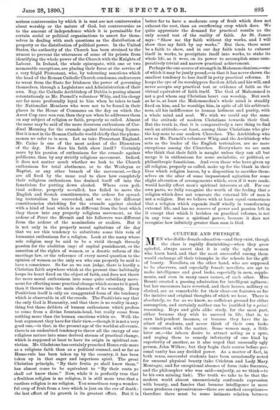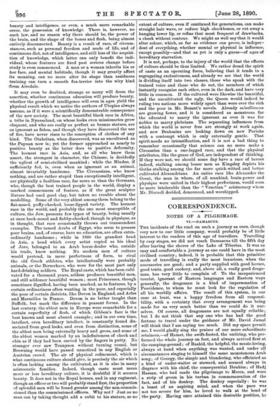CULTURE AND PHYSIQUE.
MEN who dislike female education—and they exist, though the class is rapidly diminishing—when they grow spiteful, always assert that it is only the ugly women who learn hard, and that the most successful among them would exchange all their triumphs in the schools for the gift of beauty. Novelists, on the other hand, who are supposed to be observers, and especially female novelists, are apt to make intelligence and good looks, especially in men, supple- ments, and even in many cases causes, of each other. Miss Brontë created a passing admiration for intelligent ugliness ; but her successors have reverted, and their heroes, military or clerical, are as remarkable for their clear-cut features as for the incisive and original thoughts of which we hear. There is absolutely, so far as we know, no sufficient ground for either assumption, and certainly neither can be justified by a priori reasoning. Boys and girls alike study, for the moat part, either because they wish to succeed in life, that is, to earn independent incomes, or because they have the in- stinct of students, and never think of their own looks in connection with the matter. Some women may, a little later on,—the inborn desire to attract acting as a spur, and urging them to remedy inferiority of one kind by superiority of another, as it also urged that unusually ugly person, John Wilkes ; but they begin their course before per- sonal vanity has any decided power. As a matter of fact, in both sexes, successful students have been occasionally noted for unusual physical beauty (take Crichton and Lady Mary Montagu), and for exceptional absence of form (take Socrates, and the philosopher who was said—unjustly, as we think—to be his own missing link). The truth we take to be that the modem world almost unconsciously confounds expression with beauty, and fancies that because intelligence in most cases produces expressiveness—there are marked exceptions— therefore there must be some intimate relation between
beauty and intelligence, or even, a much more remarkable -error, the possession of knowledge. There is, however, no such law, and no reason why there should be, the power of the brain, and the shape of the bones and flesh, being almost entirely disconnected. Beauty is a result of race, of circum- stances, such as personal freedom and mode of life, and of 'continuous diet, not of intelligence, and still less of the acquisi- tion of knowledge, which latter can only benefit the indi- vidual, whose features are fixed past serious change before study is even commenced. A man or a woman inherits his or her face, and mental habitude, though it may greatly affect its meaning, can no more alter its shape than assiduous training can turn a smooth fox-terrier into the wiry kind tfrom Airedale.
It may even be doubted, strange as many will deem the -assertion, whether continuous education will produce beauty, whether the growth of intelligence will even in ages yield the physical result which we notice the authors of Utopias always assume, as if it were a scientifically demonstrable consequence of the new society. The most beautiful black race in Africa, a tribe in Nyassaland, on whose looks even missionaries grow -eloquent, and who are really as perfect as bronze statues, are as ignorant as fishes, and though they have discovered the use -of fire, have never risen to the conception of clothes of any -kind. The Otaheitan, when discovered, was as uncultured as the Papuan now is ; yet the former approached as nearly to positive beauty as the latter does to positive deformity. The keenest race in Asia, and, as all who know them -assert, the strongest in character, the Chinese, is decidedly the ugliest of semi-civilised mankind ; while the Hindoo, if sufficiently fed, is, even when as ignorant as an animal, almost invariably handsome. The Circassian, who know nothing, and are rather stupid than exceptionally intelligent, are physically a faultless race, far more so than the Germans, who, though the best trained people in the world, display a 'marked commonness of feature, as if the great sculptor Nature had used good clay, but taken no trouble about the modelling. Some of the very ablest among them belong to the flat-nosed, puffy-eheeked, loose-lipped variety. The keenest race in the world, and probably the one most susceptible of culture, the Jew, presents few types of beauty, being usually at once hook-nosed and ilabby-cheeked, though in physique, as 'in thought, that race occasionally throws out transcendent examples. The tamed Arabs of Egypt, who seem to possess poor brains, and, of course, have no education, are often extra- ordinarily handsome ; while in 1860 the grandest head in Asia, a head which every artist copied as his ideal of Jove, belonged to an Arab horse-dealer who, outside his trade, knew nothing. No modern men of culture would pretend, in mere perfectness of form, to rival the old Greek athletes, who intellectually were probably .animals, or the Berserkars, who were for the most part only hard-drinking soldiers. The Royal caste, which has been culti vated for a thousand years, seldom produces beautiful men, -and still seldomer beautiful women ; most Princesses, though -sometimes dignified, having been marked, as to features, by a -certain ordinariness often wanting in the poor, and especially the poor of certain districts, like Devon in England, and Arles and Marseilles in France. Devon is no better taught than Suffolk, but mark the difference in peasant forms. In the last century, the ablest men in Europe were remarkable for a certain superfluity of flesh, of which Gibbon's face is the best known and most absurd example ; and in our own time, intellect, even hereditary intellect, is constantly found dis- sociated from good looks, and even from distinction, some of the ablest men being externally heavy and gross, and some of the ablest women marked by an indefiniteness of cheek and chin as if they had been carved by the fingers in putty. No stranger ever saw Tennyson without turning round, but Browning would have passed unnoticed in any English or Austrian crowd. The air of physical refinement, which is what continuous culture should give, is precisely the air which is often lacking among the cultivated, as it is also in many aristocratic families. Indeed, though caste must mean more or less hereditary culture, it is doubtful if it secures beauty. It does not in the Royal houses, and in any regiment, though an officer or two will probably stand first, the proportion of splendid men will be found greater among the non-commis- sioned than the commissioned officers. Why not P Just as no man can by taking thought add a cubit to his stature, so no
extent of culture, even if continued for generations, can make straight hair wave, or reduce high cheekbones, or cut away a hanging lower lip, or refine that most frequent of drawbacks, a cheek without contour. We might as well say that it would alter colour, which, as far as evidence can prove, is indepen- dent of everything, whether mental or physical in influence, except possibly—and that as yet is only a guess—of ages of hereditary starvation.
It is not, perhaps, to the injury of the world that the effects of culture should be thus limited. We rather dread the spirit of caste as an operating force, believing that it tends to a segregating exclusiveness, and already we see that the world is dividing itself into two classes, those who speak with the trained voice and those who do not, the members of which instantly recognise each other, even in the dark, and have very little in common. If the cultured were likewise the beautiful, and the uncultivated the ugly, the Queen would indeed be ruling two nations more widely apart than were ever the rich and the poor in Mr. Besant's novels. Already misalliances are growing fewer, and it is considered as monstrous for the educated to marry the ignorant as ever it was for nobles to marry plebeians. The separating influences from which the world is never free are strongly at work again, and new Brahmins are looking down on new Pariahs with a contempt which is only externally gentle. That spirit needs no intensification, and it is not a bad thing to remember occasionally that science can no more make a Circassian than a one-legged race, and that the physical attributes, like the grace of God, are independent of thinking. If they were not, we should some day have a race of heroes indeed, stalking among lesser men as Kingsley depicts his Goths stalking among the far more quick-witted and better cultivated Alexandrians. An entire race like Alexander the Great, the man in whom, of all mankind, brain-power and physique were united in their highest perfectness, would soon be more intolerable than the " Venetian " aristocracy whom Mr. Disraeli derided, denounced, and worshipped.



















































 Previous page
Previous page